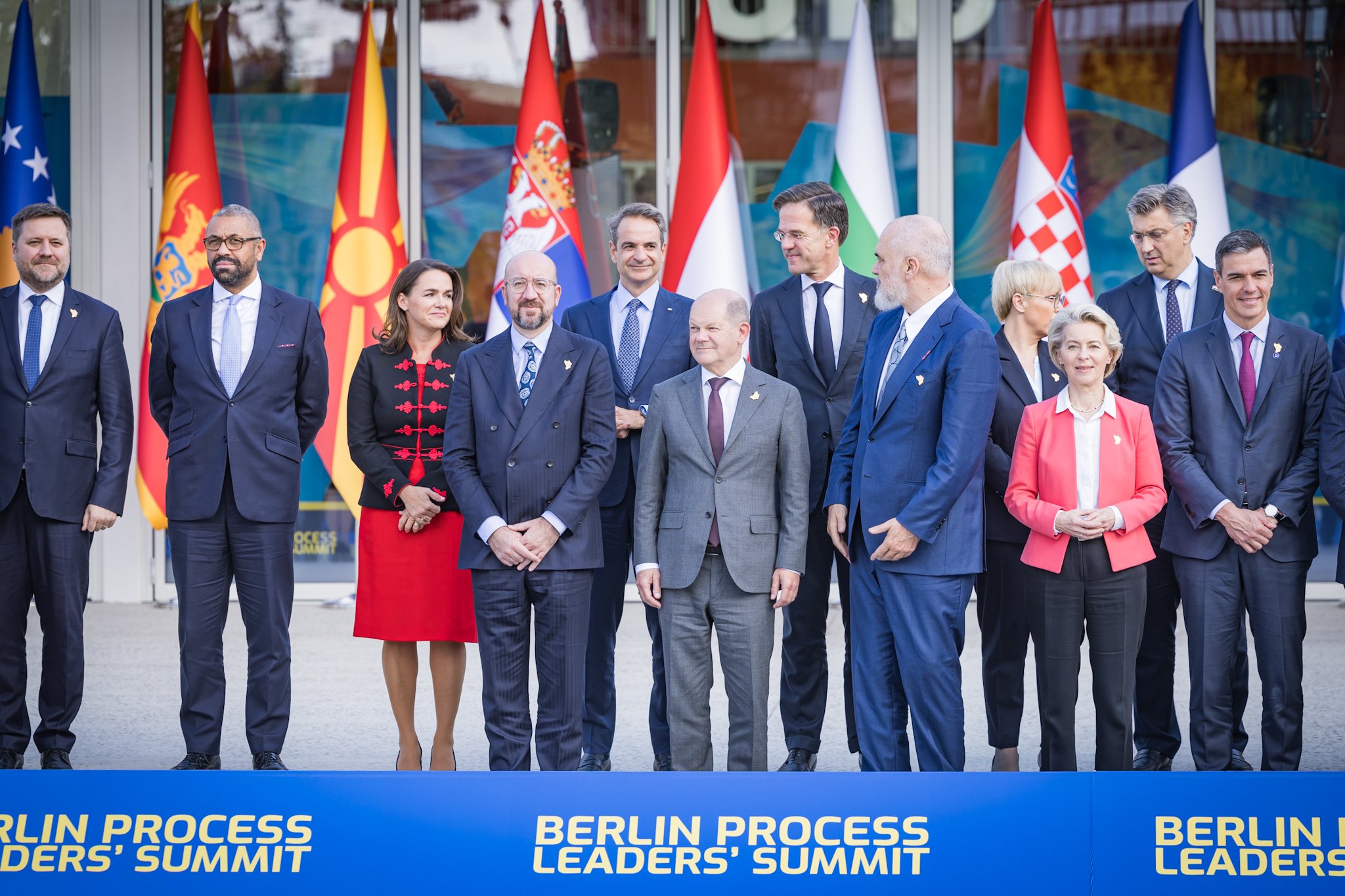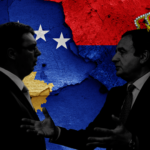The Berlin Process is a format of annual meetings that the German government of the then-Chancellor Angela Merkel launched in 2014, when a Western Balkans conference was held in Berlin. The latest summit of the Berlin Process with the participation of European Union and EU Member States leaders, and the Western Balkan prime ministers took place in Tirana. This is the first time when the Summit of the Berlin Process was hosted outside the European Union. The focus was on the integration of the region into a single market, the process of European integration, regional cooperation, support for green and digital transition in the Western Balkans, and other issues.
In his opening address, Albania Prime Minister Edi Rama said that over the past nine years, everyone witnessed countless meetings. The Western Balkans would be unthinkable without the Berlin Process. Albania’s Prime Minister also rhetorically asked whether “everyone is united in their stance to Russia’s actions in Ukraine, as we anticipate or prepare a response to the political challenges that our community is facing.” German Chancellor Olaf Scholtz in his speech noted that the Berlin Process is the best tool not only to reveal the full potential of regional cooperation, but also to accelerate the integration of all Western Balkans into the EU. “The Berlin process is a forum for cooperation. Russia’s war against Ukraine has once again shown how important it is to speak in one European voice and cooperate even more. It is time to overcome conflicts and these recent escalations in northern Kosovo,” Scholz said. The President of the European Council, Charles Michel, noted in his speech that the EU enlargement is an investment in peace and prosperity of both the European Union and its future members. The Berlin Process plays an important role in facilitating effective and operational cooperation between the partners of the Western Balkans and the EU, whose leading principle is the integration into the EU. Everyone has to prepare for the admission of new members by 2030, although this term was perceived with some skepticism, Michel emphasized, adding that, after all, for the European Union, the expansion was and will remain a process based on merit.
The leaders of the Western Balkans signed an agreement on the mutual recognition of professional qualifications of nurses, veterinary medicine specialist, pharmacists and midwives. The summit adopted joint declarations on Wi-Fi for the Western Balkans initiative, a single euro payment area (SEPA), intentions memo on regional climate partnership, plastic waste prevention, CEFTA transport community as regards facilitating trade and transportation, and the creation of the Convergence Observatory. Serbia Prime Minister Ana Brnabic said these agreements would contribute to better integration of the Western Balkans and rapprochement with the EU.
Spain’s Prime Minister Pedro Sanchez, whose country is presiding in the EU, believes that the summit is decisive, since the challenges the continent is facing have raised the issue of expansion to the top agenda of the EU. “Russia’s invasion of Ukraine has become a turning point – but not the only one. The Covid-19 pandemic, digital and economic transformation – all these problems we have to deal with have shown us that we have to build our future together. We will work fully for the united Europe,” Sanchez said.
It should be understood that the Berlin Process is an initiative aimed at expanding regional cooperation in the Western Balkans and assisting in the integration of the region’s countries into the European Union. The Berlin Process is supported by the European Commission, international financial institutions, and Member States involved in the process, together with the Western Balkan countries. The purpose of the Berlin Process is to accelerate cooperation with the six Western Balkans and the integration of the region into the EU. The initiative is mainly focused on solving bilateral and domestic problems of the region and improving economic cooperation, which will form the basis for sustainable development of the region.
At the closing conference, the President of the European Commission, Ursula von der Leyen, stated that at the Summit she introduced a new growth plan for the Western Balkans, which has the potential to double the size of the region’s economy over the decade. The new growth plan for the Western Balkans has four pillars – the introduction of the Western Balkans into the EU’s single market, the creation of a single regional market of Western Balkans, reforms, and investments. The first pillar is the entry of the Western Balkans to the EU’s single market, which actually opens the door of the EU’s single market for Western Balkans in seven key areas, including customs cooperation, e -commerce, non-cash payments, and roaming. The second pillar implies that the actors in the Western Balkans should complete the creation of a single regional market that will double the region’s gross domestic product. The third pillar is the set of reforms that are required for the Western Balkans to join the EU market, bring the region closer to union membership, and make it more attractive to European investors, given that now the economy of the Western Balkan countries is at the level of 35 percent of the EU average. The fourth pillar involves an increase in the EU funding for the Western Balkans, provided that six actors in the region will implement the necessary reforms. An investment package of EUR 6 billion is offered, as well as EUR 2 billion in grants and EUR 4 billion in loans.
Thus, the summit is deemed successful and productive. Meanwhile, the meeting between Kosovo and Serbia PMs never took place. According to Albin Kurti, he had proposals to Ana Brnabic to intensify the implementation of the agreements reached in Okhrid, but he received no response. During the joint photo op, the Serbian prime minister was absent, and during a meeting of foreign ministers, when the top diplomats made a final photo, Serbia’s foreign minister Dacic also chose not to take part. Brnabic tried explain herself as it actually turned out she did eventually join the photo op. It appears that the summit website has not published a joint photo with the Serbian prime minister, while the Serbian government has one on its platform. Of course, this is no accident as Belgrade will continue the blockade of Kosovo’s international recognition although it has no influence on the events unfolding in Kosovo’s territory, except the north. However, all participants in the summit condemned the events of September 24 in Banjska and now the question of how to hold their participants accountable as they could reveal during trial who had actually masterminded the attack. Some analysts believe Serbia will drag time until the election process starts, set to be announced on November 1. That is, they will prepare for the elections, which will obviously be held on December 17. But after the votes are cast, certain decisions will be made. Europeans and Americans understand this and will press on the issue before Aleksandar Vucic.
Meanwhile, Serbia President traveled to Beijing, where the One Belt One Road Summit was taking place. There he signed a free trade agreement with the PRC, which should enter into force in the spring of 2024. The deal is expected to cover about 10,500 Serbian goods and almost 9,000 Chinese products. At the same time, Brussels has already reminded Serbia that on the day of its accession to the EU Belgrade shall withdraw from all bilateral free trade agreements, which is a prerequisite for all countries claiming membership. Vladimir Putin is also present at the One Belt One Road Summit, so it is possible that Serbia will reach some arrangements with the Russian Federation, too.



